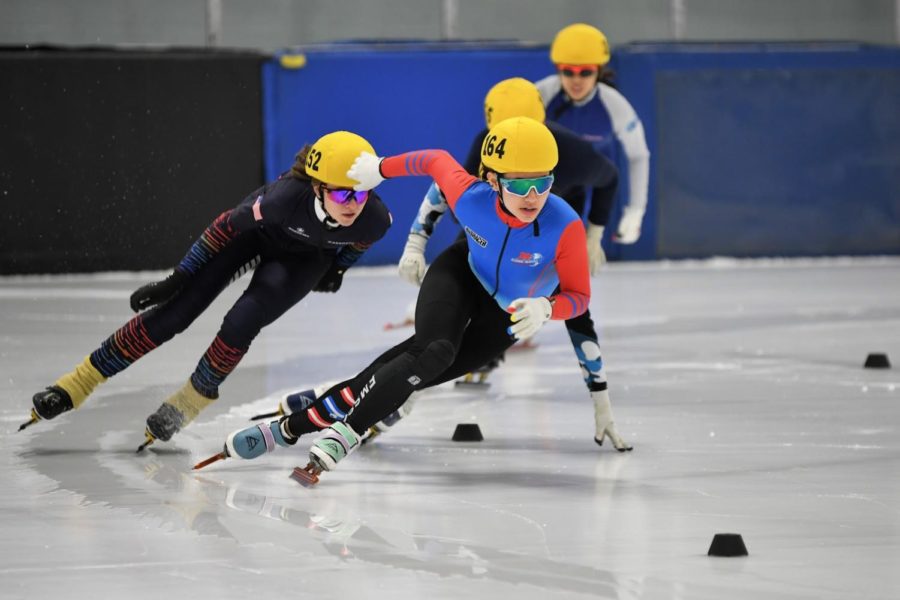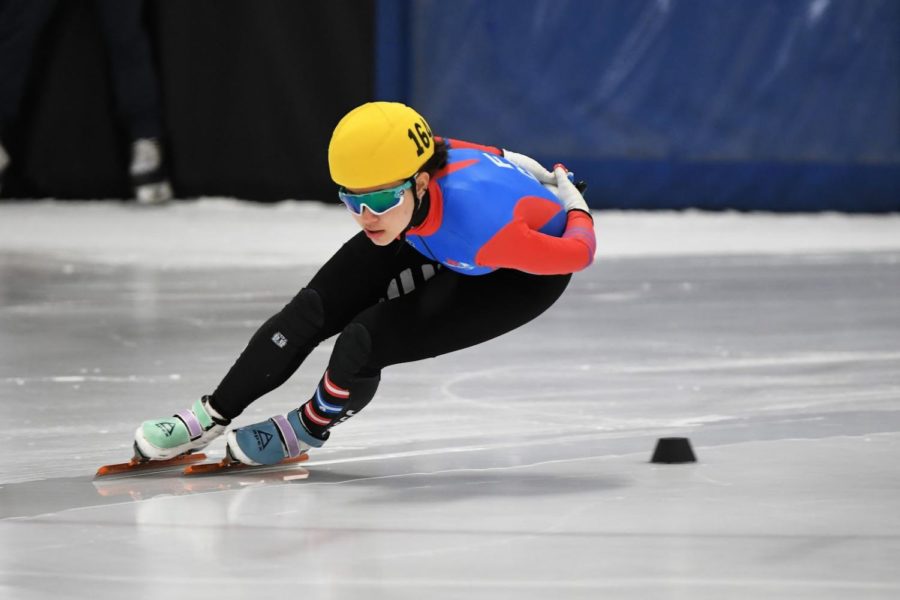A Profile of Louisiana Stahl ’23, Professional Speedskater
The background behind an Olympian athlete, Louisiana Stahl ’23, a senior at the Bronx High School of Science.
Here is Louisiana Stahl ’23 (in front) at a regional race in Buffalo, New York, on October 16th, 2022.
The whistle blows.
It’s December 18th, 2021, and I’m watching her live on NBC Sports. It’s during the 2022 Speedskating Olympic Trials.
Lou is a Bronx Science classmate, a close friend, and an international competitor. She steps onto the ice, and I wonder to myself, How did she get here?
Louisiana (Lou) Stahl ’23, a distinguished 18-year-old speedskater, one step away from making the U.S. National team, can be seen racing through the halls of Bronx Science with one hand on her backpack strap and a thermos in the other.
Do the 2,949 students at Bronx Science, her peers and her classmates, know they are sitting beside an Olympic athlete in class, or that they are stressing over derivatives and variables together?
As a toddler growing up in Rhode Island, Stahl ’23 was placed in figure skating. She grew up around ice and dedication.
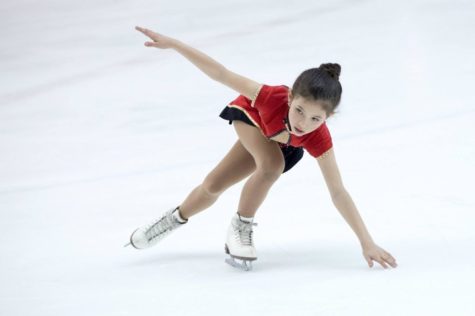
“All the girls tried figure skating and the guys tried hockey,” Stahl admits with a laugh, “but I just stuck with it.”
Even if it was the social norm when she began, she was held to meet different standards. Stahl, with three brothers, had to work harder to prove herself.
“If you’re going to do something, you go all in,” a motto that resonates within the Stahl family makes Stahl ’23 fully aware that in a family of six, she couldn’t sit around and waste time and effort spent on her. She knew she needed to put her all into skating.
Of course, as a child, it wasn’t a chore or much to think about. Toddlers don’t think about finances; Stahl was too busy hopping around in excitement with her grandfather as they headed to skating practice.
As she got older and more experienced, she realized that her love wasn’t for the sport, it was for the ice.
When she was nearly 8, Stahl and her family moved to New York City. “I tried skating at my speedskating club at a rink in Flushing. It took about a year to transition completely, but once I started doing it regularly, it was kind of obvious that it was my thing,” Stahl said.
Serhiy Lifyrenko, one of Stahl’s coaches, has watched her progress for the last 5-6 years. He was a professional skater before he became her coach at the Flushing Meadows Speed Skating Club. He was on the Ukraine National team for 15 years before retiring in 2016 and moving west to New York City. Lifyrenko’s wife found a short track speed skating club for him to participate in, but after being the only participating adult there, he saw how the teenage athletes needed proper guidance, and later became their coach.
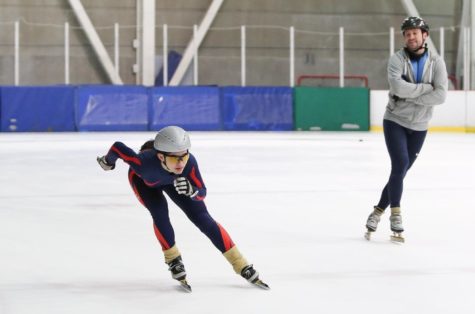
During an interview call with Lifyrenko, he told me, “I met Lou in 2017 when she was 12 years. She improved very fast in five years. In New York, it is hard for kids, because they have school and practice. But in other countries, athletes can play their sport full-time. Becoming a professional, like Lou, in five years, is a very short time. But during this time, she had very good goals.”
Due to her base in figure skating, Stahl was already working up to the point to be able to race. It wasn’t long before she found herself wanting to take the next step and advance to the next level. At almost 13, Stahl participated in her first competitive race.
“My first race was in late 2017. I wouldn’t look at it as a big race now, but back then it was one of the bigger regional races, and that really hooked me. Now even though I’m expected to win the regional races, they’re still some of my favorite races to go to,” Stahl said.
Li Geng is another one of Stahl’s coaches and is the coach of the FAST team in Utah. Li represented China on its national and World Cup speed-skating teams, and she became the assistant coach for the Chinese national speed-skating team. She oversees Stahl’s progress and improvements every summer at the Utah Olympic Oval in Salt Lake City.
When Stahl began showing potential and clear dedication, she was given a timeline for when she was expected to go to the American Cups, a national competition. Despite that, Stahl far surpassed their expectations. She had made the qualifying times for both nationals and American Cups. But being too young to push further boundaries in her speedskating career, Lou humbly accepted the experience as the underdog and took it as motivation.
Stephen Gough, the U.S. National Team and Olympic Coach, the Canadian Olympic Coach, and a Canadian Olympian himself, is Stahl’s coach for international racing and camps.
“I’ve been the head coach for a year and a half with Team USA. I know she’s spent summertime training at Salt Lake City. The sport is very demanding in that respect. That’s the main thing, to see the constant improvement in her skating measured by how fast she’s skating, her improvements in her fitness and her skating technique. Last year culminated in her skating for the Olympic trials and also the world championships,” Gough said.
On December 18th, 2021, Louisiana Stahl woke up on her birthday in her bed in Utah. She was going to race in the Olympic Trials, alone. Complications arising from COVID-19 prevented Coach Lifrenyko from accompanying Stahl. Even without that support from her mentor on this big day, Stahl remained calm.
“I was sixteen. I wasn’t expected to win or qualify, but I had made it to the Olympic Trials. I was there for the experience,” Stahl said. It was exhilarating to Stahl to just watch amazing athletes show off their techniques. Stahl and her friends gathered with their eyes glued on the next competitors. Their personal idols and celebrities were in front of their eyes, passing on years of hard-earned wisdom.
From March 4th to 6th, 2022, Stahl competed at the World Junior Championships in Gdańsk, Poland, as a relay specialist for Team USA. Team USA made it out of the quarterfinals, to the semifinals, and qualified for the B final (a preliminary final round, in between semifinals and finals, based on positioning and time), where they wound up with a penalty, leaving them tied for seventh place overall.
“She’s still very young so there’s all kinds of improvements to be made,” Gough said.
On weekdays, Louisiana Stahl hops on the Number 4 train after school to head off to practice at the World Ice Arena in Flushing, Queens. Be at the rink by 7:15 p.m. to warm up, be on ice by 8:30 p.m., get home by 9-11:30 p.m., do homework, sleep, wake up at 5:30 a.m., go to school, repeat.
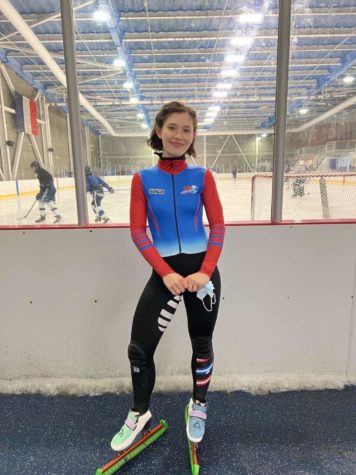
On weekends, Stahl is up at 5 a.m. to head out to a privately owned rink in Danbury, Connecticut for some extra ice time. Practice ends at 10:30 am.
Each summer, Stahl gives up family vacations and meeting up with friends, to train at the Utah Olympic Oval. She does this every day, up until a couple of days before school at Bronx Science starts.
As hectic and grueling as this schedule is, Stahl is used to it. Her days are spent itching to get back on the ice. While some students listen to music or watch shows when they’re stressed, Stahl wants to skate, to feel the ice beneath her feet and the wind on her face, and the familiar burn on her core, quads, and hamstrings. Speed Skating is a part of who she is.
But Stahl remains a realist. “Short track, especially in the U.S., or in general, is not a huge sport. The national team members have to have jobs and go to school and U.S. speedskating doesn’t give them enough money, so it’s a momentary thing. They can build up as much as they can, but at some point, they have to go and live their life. So for me, it’s really important to prioritize school, because speedskating won’t be forever.”
Louisiana Stahl, a New York City teenager, Olympic athlete, Bronx Science student, my confidant, and one of my favorite people to cheer on.
With her namesake, our friends often joke, is she a state or a star?
Louisiana Stahl’s days are spent itching to get back on the ice. While some students listen to music or watch shows when they’re stressed, Stahl wants to skate, to feel the ice beneath her feet and the wind on her face, and the familiar burn on her core, quads, and hamstrings. Speed Skating is a part of who she is.
Fairuz Omar Raya is a Features Editor and Instagram Editor for ‘The Science Survey.' She believes that journalism is a privilege that allows voices to...

